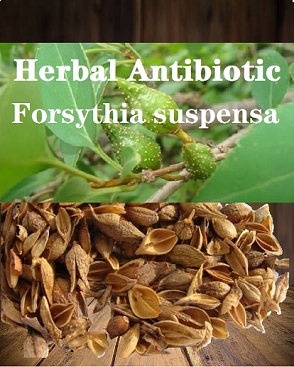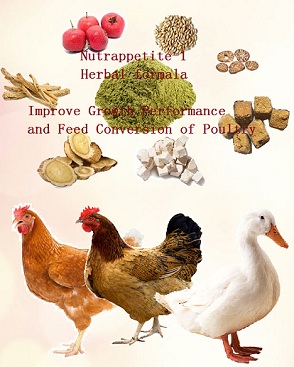- Plant-Based Protein
- Natural Plant Flavours
- Food and Dietary Supplement Ingredients
- Fruit Juice Powder
- Animal Nutrition Ingredients
- Water Soluble Ingredients
- Cosmetic Ingredients
- Unveiling the Therapeutic Potential of Rabdosia Rubescens: A Comprehensive Review
- What are the medicinal properties of Rabdosia Rubescens?
- Nutritional value of Orange Juice Powder compared to fresh orange juice.
- Processing Conditions and Nutritional Value of Orange Juice Powder
- Exploring the Versatility of Herbal Extracts in Food Flavors
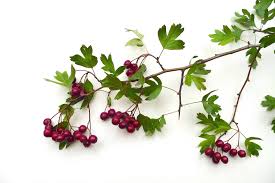
What are the health benefits of hawthorn leaf?
Welcome to our blog! Today, we are diving into the world of hawthorn leaf and uncovering its incredible health benefits. Whether you're a fan of herbal remedies or simply curious about natural alternatives, hawthorn leaf is definitely worth exploring.
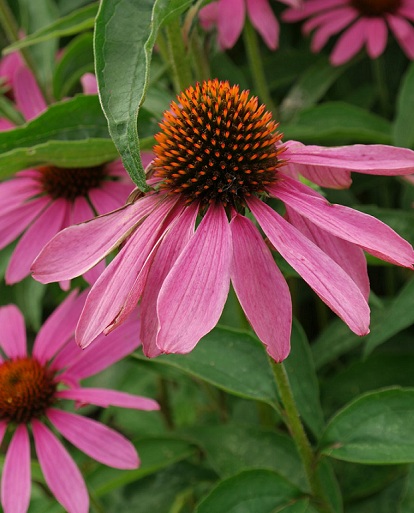

Echinacea Purpurea Extract and benefits,side effect, uses,dosage ,Alternative to Antibiotics
Echinacea purpurea is one of the most widely used medicinal herbs that is of interest to animal scientists due to its valuable immuno-stimulatory and anti-inflammatory properties. It is thought that it activates the immune system through stimulating T-cell production, lymphocytic activity, phagocytosis, cellular respiration and inhibiting the secretion of the hyaluronidase enzyme. Chicoric acid is a major active constituent of Echinacea purpurea. Echinacea purpurea (Chicoric acid)has shown to simulate growth promoters and have antioxidant, anti-diabetic, anti-inflammatory, anti-HIV, anti-bacterial, hypoglycaemic and hepatocyte protective properties.Echinacea purpurea (Chicoric acid) could be used as an alternative to antibiotics, and may improve meat quality and health status in broiler chickens.
Background
Feed additives with performance and health stimulating effects are widely used in animal production. For a long time antibiotics have been the dominating substances in animal nutrition with distinct growth promoting effects. After the ban imposed on the subtherapeutic use of antibiotics in animal feeds in European Union (EU) and the increasing demand of organic animal products, alternative substances are required, which can maintain health and improve performance of livestock without any residual effects. Echinacea purpurea is one of the most promising phytogenic additives due to its immuno-stimulatory and potentiatory properties. Echinacea has been widely investigated in laboratory animals, as well as it is under continuous study in human trials for its potential clinical use. It contains a variety of active substances like alkamides, glycoproteins, polysaccharides, phenolic compounds, cinnamic acids, essential oils and flavonoids, which are effective in treatment of various ailments and improving immunity and health. The toxicity of Echinacea is reported to be very low. Present research on the use of Echinacea in livestock is limited, but it can be used as a guiding line and rationale for its use in livestock. In this review, the extent of present knowledge and need for future studies are discussed in the light of effectiveness of active substances of E. purpurea in improving health, performance and immunity of various livestock species.

What you may get from us: If you're developing a product that contains plant active ingredients from Echinacea Purpurea.I think you can find the information or products you need here.
Simple production process in our factory: After the plant is collected, raw material will be processed by solvent extraction, separation and purification, filtration, concentration, drying and other steps to form the final products. We may also design a prouction process based on your special requirements.
Through the physical and chemical processes, those compunds you don't want was removed, and the compunds preferred was accumulated. Which make the products achieve the best effects.
How to use Echinacea Purpurea Extract powder: What you need is just use our products to formulate your products. It can be mixed with your other ingredients directly to make premix products. It can also be directly used for premix. And if your dosage form is tincture or solution, It can also be suitable. Easy to say, our products are ready for Formula products.
|
100% Echinacea Purpurea Standardized Extract |
||
|
CAS No. |
90028-20-9 |
|
|
Appearance |
Powder |
|
|
Color |
Brown |
|
|
Partical size |
Normally pass through 80mesh |
|
|
Pack size |
25 kg per paper drum |
|
|
Purity of active compunds |
4% Phenolic Compounds (Chicoric acid) |
By UV |
|
For pricing or more information, please call 86 29 88444632 or send an email to Sales@nutraherbsource.com.
|
||
Common Names of raw material: Red Sunflower, Purple Coneflower, Black Sampson, Hedgehog, Coneflower, Snake Root, Sampson Root, Rudbeckia, Comb Flower, Indian Head
Latin Names: Echinacea purpurea
Plant Description:

Echinacea is a perennial herb native to the midwestern region ofNorth America. It has tall stems, bears single pink or purple flowers, and has a central cone that is usually purple or brown in color. The large cone is actually a seed head with sharp spines that resemble a stiff comb.
Constituents of Echinacea purpurea
Contain caftaric acid (C13H12O9),chicoric acid (C22H18O12),chlorogenic acid (C16H18O9),and echinacoside (C35H46O20))
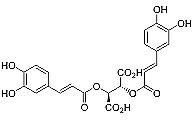
|
Cichoric Acid |
|
|
70831-56-0 |
|
|
C22H18O12 |
|
|
474.34 g/mol |
|
How Does Echinacea Boost The Immune System?
There are a lot of immune-boosting herbs and they work in different ways. The way echinacea works is really interesting.
First, it contains echinacoside, a natural antibiotic that works the same as penicillin; so it can kill a broad range of viruses, bacteria, fungi, and protozoa. This makes it a really valuable herb to have around for wound healing and sick dogs or other livestocks. Echinacea also contains echinacein, which protects against germy attacks by neutralizing the tissue-dissolving enzyme hyaluronidase, which germs produce.
Echinacea can increase macrophage activation — by increasing production of interferon gamma. In addition, one study showed that Echinacea extracts can boost T-cell production by up to 30 percent more than immune boosting drugs. Echinacea also increases production of the chemokines interleukin-8 and MCP-1, which enhance the migration of immune cells to the site of infection.
Pharmacological properties of Echinacea
Echinacea is very popular for its effects on the immune system. Results of some experiments studying pharmacological properties of Echinacea showed its properties by stimulation of various immune cells such as macrophages, other monocytes, and natural killer (NK) cells during in vitro as well as in-vivo studies.
Use of Echinacea in Livestock and its health benefits.
Presence of a variety of pharmacologically active substances in E. purpurea and prove of their activity in vivo as well as in vitro experiments suggest that it may be beneficial in maintaining health and improving performance and immunity in livestock. There are a number of products and preparations made from E. purpurea, which can be administered through drinking water as well as through feed. The dosage of Echinacea preparations for livestock species is not available, so due to lack of data, researchers adjusted dose level on the basis of human medical recommendations (0.25ml/kg BW0.75). The following overview provides some species specific information on the pharmacology, toxicity, and clinical application of Echinacea in various livestock species, including cattle, horse, poultry and swine.
Cattle
Schuberth et al. (2002) studied the effect of an Echinacea purpurea tincture (containing 70% ethanolic extract of Echinacea purpurea), Thuja occidentalis, and elemental phosphorus on bovine leucocytes. Bovine mononuclear cells (MNC) and polymarphonuclear (predominantly neutrophils) cells were isolated from cows and cultured for up to 44 hours in the presence and absence of an extract of the product and its individual components. Flow cytometry results showed no significant effect of individual components, which included Thuja occidentalis, Echinacea purpurea, and elemental phosphorus, on MNC. However, Echinacea purpurea was able to enhance the ability of the PMN to kill target cells via antibody-independent cytotoxicity.
Horses
Along with a variety of herbs, Echinacea is also used as immune booster to compliment a healthy immune system of horses. According to Williams and Lamprecht (2007), best way to use Echinacea is to supplement at the first signs of illness or infection. Echinacea extract may increase the production of lymphocytes and decreased the level of circulating neutrophils in the blood presumably by increasing membrane permeability and migration into tissues. Echinacea administration increased the number of red blood cells and haemoglobin, showing its effect on the oxygen transport mechanism.
Swine
Preparations made from Echinacea purpurea have been reported to improve swine health, performance, and meat quality. Supplementation of Echinacea purpurea water extract (500 mg/kg of feed) in pig diets improved body weight gain and feed conversion, reduced cholesterol contents of meat and improved its lightness (Hanczakowska, 2007). Intermittent application (2 or 5 days) of Echinacea purpurea juice followed by 12 or 9 days of interval improved health of pigs by increasing number of lymphocytes and leucocytes and increased phagocytosis rate of granulocytes (Böhmer et al., 2008). The higher dose of extract (1000 mg/kg feed) improved water holding capacity of meat and raised it pH at 45 min after slaughter (Hanczakowska, 2007). Kuhn et al. (2005) studied the effect of supplementation of Echinacea purpurea ethanolic extract (0.125 ml/kg body weight) in liquid feed during the whole pregnant and suckling period of sows in six intervals (5 days treatment, followed by 2 weeks of break, respectively). The Echinacea purpurea treatment of sows resulted in immunostimulatory effects both in sows and piglets with highest change in peripartal period. In one day old piglets, the concentrations of IgG, IgA, and CRP were significantly increased in Echinacea purpurea group (P = 0.004, P < 000.1, P = 0.05, respectively). Up to 70 days of age, the rate of therapeutical treatments of piglets from Echinacea purpurea treated sows was decreased in tendency (P = 0.08). The growth performance and carcass quality of offspring was not affected by Echinacea purpurea treatment of sows.
Is Echinacea Safe?
Some pets or livestocks can be sensitive to the antigens in echinacea and you may see allergy symptoms. These livestocks shouldn’t take echinacea. Also, many livestocks suffer from immune mediated diseases and echinacea can aggravate these diseases. So if your pet or livestock has this type of chronic disease, it’s best to check with your holistic vet before giving him echinacea.
But it’s important to understand the power of echinacea really relies on a healthy immune system. If your pet or livestock is healthy, then echinacea will work great to boost his ability to fight disease before it happens.
Dosage:
For general immune system stimulation, during colds, flu.
For livestocks: 0.25ml/kg of Echinacea extract containing 4% phenolics
For pets: give 12 to 25 drops of echinacea tincture, three times daily.



